

Social Epistemology and Epistemic Agency - Rowman & Littlefield International. Edited by Patrick J.
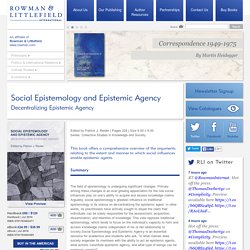
Reider | Pages 224 | Size 9.00 x 6.00 Series: Collective Studies in Knowledge and Society This book offers a comprehensive overview of the arguments relating to the extent and manner to which social influences enable epistemic agents. Summary The field of epistemology is undergoing significant changes. Primary among these changes is an ever growing appreciation for the role social influences play on one’s ability to acquire and assess knowledge claims. Reviews This volume is an important contribution to both social epistemology and the theory of epistemic agency, and it can be read with profit not only by professional philosophers but by everyone who is interested in how we can improve knowledge in our communities. This intriguing volume brings together philosophers and sociologists with very different conceptions of what social epistemology is, or should be, and what it might contribute to our understanding of social agency.
Table of Contents Author Bio Patrick J. How not to say the wrong thing. When Susan had breast cancer, we heard a lot of lame remarks, but our favorite came from one of Susan's colleagues.
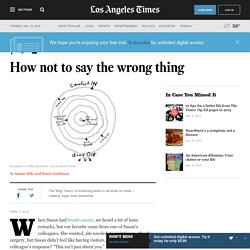
She wanted, she needed, to visit Susan after the surgery, but Susan didn't feel like having visitors, and she said so. Her colleague's response? "This isn't just about you. " "It's not? " Susan wondered. The same theme came up again when our friend Katie had a brain aneurysm. YEAR IN REVIEW: 10 tips for a better life from The Times' Op-Ed pages in 2013 This woman loves Katie, and she said what she did because the sight of Katie in this condition moved her so deeply. Susan has since developed a simple technique to help people avoid this mistake. Draw a circle.
Developing a Research Problem: step by step. Communication Skills. Wisdom in the Age of Information and the Importance of Storytelling in Making Sense of the World: An Animated Essay. What Elvish, Klignon, and Dothraki Reveal about Real Language & the Essence of Human Communication. It’s a “Story Problem”: What’s Behind Our Messed-Up Economy by David Korten. The peoples of earlier times prospered from the guidance of simple stories that offered answers to their deepest questions.

We need those now more than ever. posted Jul 18, 2013. Vladimir Nabokov on Writing, Reading, and the Three Qualities a Great Storyteller Must Have. By Maria Popova “Between the wolf in the tall grass and the wolf in the tall story there is a shimmering go-between.
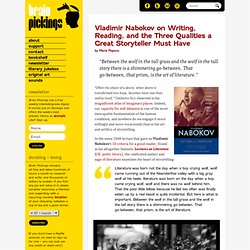
That go-between, that prism, is the art of literature.” “Often the object of a desire, when desire is transformed into hope, becomes more real than reality itself,” Umberto Eco observed in his magnificent atlas of imaginary places. Show Your Work: Austin Kleon on the Art of Getting Noticed. By Maria Popova How to balance the contagiousness of raw enthusiasm with the humility of knowing we’re all in this together.
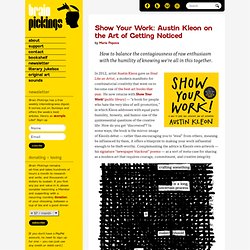
In 2012, artist Austin Kleon gave us Steal Like an Artist, a modern manifesto for combinatorial creativity that went on to become one of the best art books that year. He now returns with Show Your Work! (public library) — “a book for people who hate the very idea of self-promotion,” in which Kleon addresses with equal parts humility, honesty, and humor one of the quintessential questions of the creative life: How do you get “discovered”? In some ways, the book is the mirror-image of Kleon’s debut — rather than encouraging you to “steal” from others, meaning be influenced by them, it offers a blueprint to making your work influential enough to be theft-worthy. How to Be a Writer: Hemingway’s Advice to Aspiring Authors. 5 Tips To Find Your Authentic Writing Voice. I've always known that language helps us be seen, heard and understood in this world.

Without it, we have no voice. Words connect us to each other. Without language we are cut off. Annie Dillard on the Art of the Essay and Narrative Nonfiction vs. Poetry and Short Stories. By Maria Popova “Writers serve as the memory of a people.
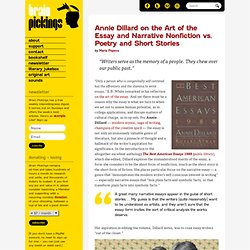
They chew over our public past.” “Only a person who is congenitally self-centered has the effrontery and the stamina to write essays,” E.B. White remarked in his reflection on the art of the essay. And yet there must be a reason why the essay is what we turn to when we set out to assess human potential, as in college applications, and discuss matters of cultural charge, as in op-eds. Seth Godin: How to get your ideas to spread.
Framing The Story : TED Radio Hour. A Developmental Tour of the Imagination: What Children's Use of Metaphor Reveals about the Mind. By Maria Popova “Metaphorical thinking … is essential to how we communicate, learn, discover, and invent.” “Children help us to mediate between the ideal and the real,” MoMA’s Juliet Kinchin wrote in her fascinating design history of childhood . Indeed, children have a penchant for disarming clarity and experience reality in ways profoundly different from adults , in the process illuminating the workings of our own minds. The Adverb Is Not Your Friend: Stephen King on Simplicity of Style. “Employ a simple and straightforward style,” Mark Twain instructed in the 18th of his 18 famous literary admonitions.
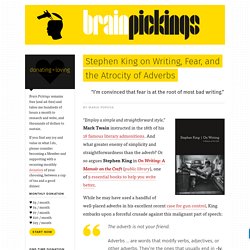
And what greater enemy of simplicity and straightforwardness than the adverb? Or so argues Stephen King in On Writing: A Memoir on the Craft (public library), one of 9 essential books to help you write better. While he may have used a handful of well-placed adverbs in his excellent recent case for gun control, King embarks upon a forceful crusade against this malignant part of speech: The adverb is not your friend.Adverbs … are words that modify verbs, adjectives, or other adverbs. Dare to Disturb the Universe: Madeleine L’Engle on Creativity, Censorship, Writing, and the Duty of Children’s Books. By Maria Popova “We find what we are looking for.
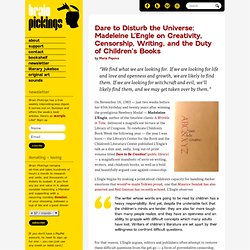
If we are looking for life and love and openness and growth, we are likely to find them. If we are looking for witchcraft and evil, we’ll likely find them, and we may get taken over by them.” On November 16, 1983 — just two weeks before her 65th birthday and twenty years after winning the prestigious Newbery Medal — Madeleine L’Engle, author of the timeless classic A Wrinkle in Time, delivered a magnificent lecture at the Library of Congress. Famous Advice on Writing: The Collected Wisdom of Great Writers.
By Maria Popova By popular demand, I’ve put together a periodically updated reading list of all the famous advice on writing presented here over the years, featuring words of wisdom from such masters of the craft as Kurt Vonnegut, Susan Sontag, Henry Miller, Stephen King, F.
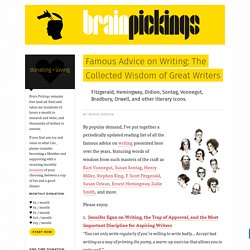
Scott Fitzgerald, Susan Orlean, Ernest Hemingway, Zadie Smith, and more. Please enjoy. The Art of Wisdom and the Psychology of How We Use Categories, Frames, and Stories to Make Sense of the World. 5 Things Every Presenter Should Know About People, Animated. Learn to Become a Phenomenal Storyteller with Pixar's 22 Writing Rules. How We Got "Please" and "Thank You" By Maria Popova Why the line between politeness and bossiness is a linguistic mirage. “A good thing to think about is what kind of face to make when you say please,” Ruth Krauss wrote in her magnificent final collaboration with Maurice Sendak .
“That coat will be the last gift [your mother] gave you. How To Stay Sane: The Art of Revising Your Inner Storytelling. “I pray to Jesus to preserve my sanity,” Jack Kerouac professed in discussing his writing routine. But those of us who fall on the more secular end of the spectrum might need a slightly more potent sanity-preservation tool than prayer. That’s precisely what writer and psychotherapist Philippa Perry offers in How To Stay Sane (public library), part of The School of Life’s wonderful series reclaiming the traditional self-help genre as intelligent, non-self-helpy, yet immensely helpful guides to modern living.
At the heart of Perry’s argument — in line with neurologist Oliver Sacks’s recent meditation on memory and how “narrative truth,” rather than “historical truth,” shapes our impression of the world — is the recognition that stories make us human and learning to reframe our interpretations of reality is key to our experience of life: Our stories give shape to our inchoate, disparate, fleeting impressions of everyday life. Perry concludes: Primed For Success: Crafting the Optimal Message that Succeeds. Crafting the optimal messaging to appeal to your target audience is “mission critical”. Deirdre Coleman explores the area of heuristics and evolutionary search algorithms to arrive at the optimal messaging that is primed for success. In recent years, there has been considerable rethinking in the fields of cognitive psychology and neuroscience, on how human beings make choices.
It is now well acknowledged that decisions on even complex issues are often a result of simple ‘rules of thumb’ rather than elaborate analysis and deep thought. The brain has an innate need to simplify choices and use mental shortcuts – which means that people have the ability to make decisions quickly, intuitively, almost subconsciously. Market researchers are often obsessed with “why”: why did one marketing message resonate with a patient or healthcare professional more than the others; why did they prefer one benefit statement over another. Don’t Ask Why Return on Insight: Evolutionary Algorithms. How to Give a Great Presentation: Timeless Advice from a Legendary Adman, 1981. The Shape of Spectacular Speech: An Infographic Analysis of What Made MLK’s “I Have a Dream” Great. Joseph Conrad on Writing and the Role of the Artist.
How Hans Christian Andersen Revolutionized Storytelling, Plus the Best Illustrations from 150 Years of His Beloved Fairy Tales. Joan Didion on Telling Stories, the Economy of Words, Starting Out as a Writer, and Facing Rejection. Create Write Live - The New Story Summit at Findhorn. Jeanette Winterson on Adoption, Belonging, and How We Use Storytelling to Save Ourselves. Six Strategies That Have Quickly Improved My Writing. What Makes People Compelling.
Six Tips on Writing from John Steinbeck. How to Explain Complex Ideas (Like Tech) to Those Who Don’t Understand. Annie Dillard on Writing.